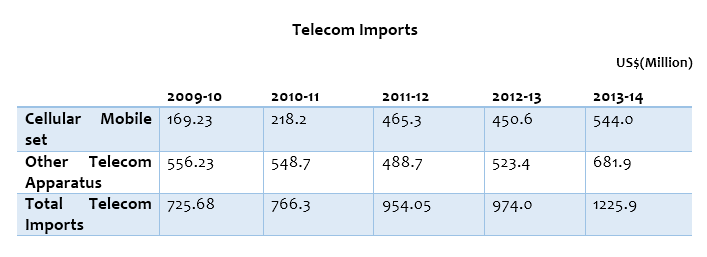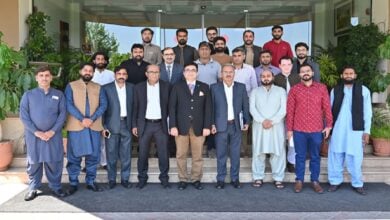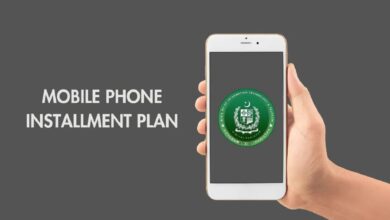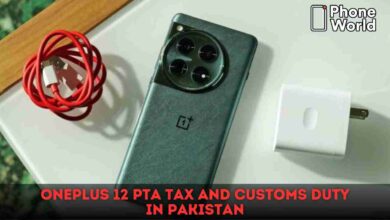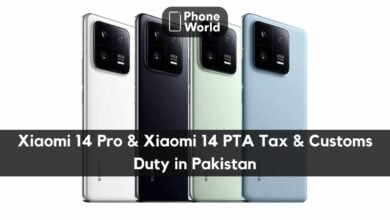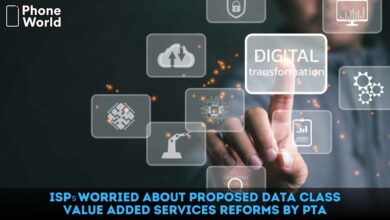M-Governance in Pakistan; A Performance Update

The advancement made in the technology sphere over the last decade is overwhelmingly impressive, especially the progression made in the mobile technology has completely changed the meaning of life. It can be easily said that this technological evolution has taken far more important role than biological evolution for humanity’s near future, as the devices we use have changed the way we live much faster than any contest among genes.
All aspects and parts of technology has evolved human life and taken it to an entirely different level but the evolution of mobile technology has had a most profound socio-economic impact on global economies. This impact is not only deep and intense but it is also spanning on many aspects of economic, political and social life.
Mobile is the Cornerstone in all Technological Advancements
Since mobile cellular became commercially available in the early 1980s, it has advanced beyond imagination in terms of coverage, services, technology, handsets and regulation. Mobile broadband internet has especially changed the way how consumers access and use the internet now. End users are consuming content and services in new ways (such as over-the-top [OTT] and off-net), across new devices (such as smartphone, netbooks, e-readers, and tablet computers), and interacting with other users in ways that people only imagined decade back. It has empowered the previously alienated communities by bridging the digital divide by bring voice and data services to the unconnected.
Internet use continues to grow steadily, at 6.6% globally in 2014 (3.3% in developed countries, 8.7% in the developing world). The number of Internet users in developing countries has doubled in five years (2009-2014), with two thirds of all people online now living in the developing world.
Mobile has become the integral part of everyone’s lives. Easy access to the mobile internet and other related services have not only improved communication but have also demonstrated significant improvement in education, health, security and agriculture productivity while creating employment opportunities as the same time.
The mobile industry has scaled dramatically over the last decade and today we rely on our mobile applications and services for everything, whether we are at work or at home, travelling or looking for information. Mobile is the answer to almost our every problem. According to ITU’s flagship annual measuring the Information Society Report, over three billion people are now online. Latest data show that Internet use continues to grow steadily, at 6.6% globally in 2014 (3.3% in developed countries, 8.7% in the developing world). The number of Internet users in developing countries has doubled in five years (2009-2014), with two thirds of all people online now living in the developing world.
According to Central Asian Cellular Forum, it is expected that by 2025, there will be over 80 million mobile broadband users in Pakistan, which some industry analyst considers to be quite conservative specially when the total mobile subscriptions would be swelling to over 190 Million by 2025.
Pakistan ICT Sector; A Land of Opportunities
Pakistan is among the highly populated countries of the world with over 190 million people and expects to grow to 226 million by 2025. This makes Pakistan a huge customer market especially for the ICT sector. Pakistan currently has a mobile penetration rate of 76% with more than 139.9 by the end of June, 2014, million. Mobile subscribers and growing at over 10 million new subscribers every year for the past 5 years. According to Central Asian Cellular Forum, it is expected that by 2025, there will be over 80 million mobile broadband users in Pakistan, which some industry analyst considers to be quite conservative specially when the total mobile subscriptions would be swelling to over 190 Million by 2025.
It takes years for countries to upgrade to 4G from 3G but Pakistan has cut across this in one giant big leap and now it is right there in the big league.
The future prospects are looking brighter specially after the recent auction of 3G/4G spectrums in April 2014 and PTA’s resolve to offer additional mobile spectrum for mobile broadband in the months or years to come. The availability of low cost smart phone devices together with mobile broadband service is also expected to trigger more and more mobile service use in the country.
Technology Evolution in Pakistan
Although Pakistan is going through some major crisis and the overall economic scenario of the country is not really encouraging but despite all the predicaments ICT sector of Pakistan is flourishing at a steady pace. A lot of developments can be seen in different areas of the ecosystem as many players are entering the market. The 3G/4G auction of 2013 has especially opened many doors of progress and development. More and More users are turning toward 3G/4G services indicating that Pakistan go to a comparatively faster start as compared to similar markets.
With the beginning of this new era of technology everyone is excited and looking forward to the prospects it will bring in the future. It takes years for countries to upgrade to 4G from 3G but Pakistan has cut across this in one giant big leap and now it is right there in the big league. It is not just high speed internet, rather it is affecting people in many different ways and paving its way to build a better Pakistan. This will help to attract big tech companies of the world to launch their services in Pakistan. Google has recently added Pakistan to the List of Supported Countries for Play Store Merchant Accounts and Apple and Lenovo have also established their footprint in Pakistan by launching their products through various operators and distributors. Pakistan has also made its mark in the international workforce market by becoming one of the largest freelancing community on Elance and Odesk. This has not only created more job opportunities in the country but the entrance of new tech companies have also increased the tax bracket and strengthen the economy.
According to PTA’s year-end report the cellular penetration has reached 76% as compared to 71% in financial year 2013. The penetration increase is highest in the last six years indicating a new stir in the market with successful launch of NGMS in the country. Number of active mobile SIMs has also reached 139.0 million at the end of June 2014 depicting growth of 9.1%.
With the advent of 3G/4G technology in the country the telecom imports have also improved. Operators upgraded their networks and systems, and scribers opted to shift to 3G/4G enabled handsets to enjoy the latest fast paced services. Resultantly, 2014 witness record imports of US $ 544 million of cellular mobile handsets and US $ 682 million worth of telecom equipment registering growth of 20.7% and 30.3% respectively.
M-Governance; Personification of Good Governance
Technology cannot bring any changes unless and until it is not properly used. For effective and efficient results it is essential that the technology is used to its fullest, exploring all its dimensions and benefits. 3G/4G itself probably doesn’t mean anything more than fast internet but the important thing is that how this wild internet speed is being used in different walks of life.
Technology is a field in which private tech-giants have taken the lead but government administrations are not only facilitating the change but are also using it to bring efficiency in their own service delivery to its public as well. The concept of e-everything has become old now and the world is moving towards mobile era. The mobile technology has taken the lead and changed the meaning of everything. Smart cities and Internet of Things are among the most popular movements that are trending right now. Bahria Town has recently expressed an interest to hire a consultancy firm for designing ICT services based on smart city concept for an integrated residential cum commercial Mega Urban Township and the laying of an optic fiber cable network infrastructure. Although the initiative has been taken by private sector but it is a huge step in the ICT industry of Pakistan.
The mobile technology has taken the lead and changed the meaning of everything. Smart cities and Internet of Things are among the most popular movements that are trending right now.
There are countless ways in which the new technology can be used, particularly natural disasters — floods and earthquakes, which we face almost every other year. Communication can be established easily and rapidly with the help of 3G and 4G. Help can reach faster once the location is known and so can the medical facilities and services can be availed much easier and in wide variety of ways.
After e-government m-government is an up-and-coming concept in Pakistan taking governance to a different level. It is a technique in which wireless technology is used which allows the government to engage citizens actively in real time information. Now that number of mobile phone subscribers is increasing worldwide, m-government is becoming a crucial part in the development of a country. The government can use this technology in variety of ways; it has enabled the government to perform its official tasks and duties in an efficient way while at the same time it has revolutionized how citizens’ access to digital services.
Most of the states in the West and even Asian countries have adopted mobile governance technologies in emergency situations, whereby the government informs its citizens about emergency updates via mobile phones, PDAs and pagers. But Pakistan is moving a step forward from this and is planning to impart technology in each and every governmental activity. The government plans to use mobile technology to improve public services like healthcare, education, security and environmental management, with the increasing digitization of human activity making it possible to gather and analyses data from a huge range of disparate sources.
After e-government m-government is an up-and-coming concept in Pakistan taking governance to a different level. It is a technique in which wireless technology is used which allows the government to engage citizens actively in real time information.
Federal Government is very active and systematic in its approach to bring latest technology in use for sustainable growth in the country. Ministry of Planning, Development and Reform of Pakistan has started its good governance initiative under Pakistan 2025 vision. The government has planned to bring reforms in public sector services to create and performance and citizen centric governance by using technology to implement e-governance and m-governances techniques. The Federal Minister for Planning and Development Professor Ahsan Iqbal said that building strong technological base is government’s priority for developing a competitive Knowledge Economy.
Connected Living – Linking the Physical and Digital Worlds
The prospects of m-government practice seem quite bright. The government is trying to get the maximum output out of this method by facilitating the public in every possible way. The government has started providing basic services to the people. In 2013 elections the Pakistan government for the first time used mobile SMS service for verification of voters and their respective polling stations.
The Election Commission of Pakistan won its first ever international award for its 8300 SMS Service prior to the May 2013 elections. The service was launched in collaboration with the National Database and Registration Authority and according to the data released by the organization, More than 51.8 million citizens used the SMS service to verify their voting information. This year Election Commission was also nominated in the International Electoral Awards in the categories of Citizen’s Engagement Award, First Time Voter Award and Minority Participation Award. Among other notable m-government services provided by the government include NIC Verification (Prove Your Identity), PTA SIM Identification & Verification System, PTCL Bill Payment Point and PTCL SMS Complaint Service. The National Response Centre for Cyber Crimes has also started an SMS alert system to create awareness about the cybercrimes. Under this initiative, SMS alerts will be sent to mobile phone users about trending cybercrimes including fake lotteries, money prizes, fake ads, Facebook security, privacy matters and so on. Citizens can also register their complaints through sending a SMS to 0336-6006060.
Provincial IT ministries are especially playing quite active part in introducing technology in its departments to improve their efficiency and effectiveness. In this regard the governments of Khyber Pakhtoonkha and Punjab are the front runners. The initiatives taken by both government are worth mentioning, and the progression from e-government to m-government is very encouraging indeed.
M-Government Initiatives in Punjab
Punjab is the most populated province of the country with adult literacy rate of 57 percent. The people of Punjab are very aware of the new trends and so is the government. Punjab government has shown a very serious attitude in ensuring the betterment of its citizens. The initiatives taken by the Punjab Information Technology Board are truly remarkable. Despite massive explosion of mobile applications, most governments lag behind and their applications only provide information about public services and agencies but government of Punjab has truly unleashed the real potential of smartphones and applications. Below are some ground-breaking innovations of mobile applications that the government of Punjab is rolling out with World Bank support.
Corruption is the biggest administrative problem that has plagued the country for many decades now and effectively monitoring its own work had become the biggest dilemma of Pakistanis government. The Pakistan Information Technology Board with technical assistance from World Bank initiated various projects to guarantee efficient monitoring system for worker’s activities. When the epidemic of dengue virus spread and the Punjab government was initially unsuccessful in controlling the virus, the Punjab Information and Technology Board built the Dengue Monitoring System to capture real time and geo-mapped information about the dengue outbreaks and the different efforts to combat the epidemic. Government supplied 1500 smartphones to its city worker who were asked to take photos before and after their anti-dengue tasks and upload them, tagged by location. Reports from hospitals were uploaded and geo-tagged to predict dengue outbreaks and search for mosquito-larvae reservoirs. The system allowed the government to focus better the anti-dengue interventions and provide a quicker response. Compared to 16,000 infected and 352 deaths in 2011, there were no deaths and only 234 confirmed Dengue cases in 2012. This system has led to a full-blown real-time disease surveillance system in Punjab, tracking all 26 WHO notifiable infectious diseases.
The government of Punjab has introduced Citizen Feedback Model to improve citizens’ lives and build a strong citizen-state relationship. . Rather than waiting for citizens to approach it with grievances, it actively seeks feedback from citizens through calls and text messages. Users receive automated call with Chief Minister’s voice followed by a SMS enquiring about the quality of service they received. Thousands of citizens replied to these calls and SMSs and reported their problems regarding, public service, health, revenue, police etc. this model has now become a regular part of monitoring and several officials have been punished and asked to explain the allegations.
The Punjab Public Management Reform Program is another impressive initiative taken by the Punjab Government. This system was rolled out to address and overcome the weaknesses of traditional monitoring system. The program spans over seven key departments of Government of Punjab including Livestock and Dairy Development, Agriculture, Health, Irrigation, Board of Revenue, Education and Local Government and Community Development. Phased implementation is underway in line with results framework as defined in “Project Appraisal Document” (PAD) for five year long program. Details of some of these projects are discussed below:
The Monitoring the Monitors Program was an earlier pilot of the Dengue Monitoring System. In February 2014, PITB took up this project and renamed it as “HealthWatch”. Currently, the “HealthWatch” initiative is successfully running throughout Punjab with more than 3500 activities submitted since its re-launching on February 5th 2014. Under this system, Android-based smartphones have been provided to districts supervisory officers reported data through HealthWatch application for indicators like non-functional equipment, stock-out medicines and absenteeism, they are also asked to enter the results of the visits to the health facility, including a self-photo to prove that they were present at the time of inspection. The information is automatically uploaded into the database for validation and a real time reports are generated with user-friendly maps and charts.
VET Inspect; a smart phone application for District Livestock Officers (DLOs) and Deputy District Livestock Officers (DDLOs) throughout Punjab. “Vet-Inspect” enables district administrative officers to inspect facility per pre-defined KPIs and report data on the move, the data is submitted using smart phones.
Besides the centralized Citizen Contact Centre (CCC) platform for multiple government departments, the Punjab government has also set up a round the clock Zamindar Shehri Helpline (0800-02345) that consumer rights issues and WASA Complaint Management System has been designed to cater the complaints raised by the general public for water and sanitation related issues. Field staff as equipped with smart phones view assigned complaints and resolve them by reporting status and pictorial evidence via edge in real time. Assignments are pushed on to the devices of field officers and they are directed to visit the specified location to perform the assigned activity. The response submitted by field staff gets plotted on GPS map automatically against the complaint assignment. Integrated mechanism on ground ensures effective monitoring of daily activities thus improving service delivery.
Back in 2013, the Punjab Government also introduced Hajj Monitoring and Management Systems that served as a vast complaint registration platform that only registered complaints and collected feedback through three different mediums, one of which is a dedicated Android application for complaint registration and feedbacks.
Punjab Government is also planning to develop a platform that will enable people with non-IT background to use a monitoring application by simply dragging-and-dropping components. One of the applications that PITB has designed is for irrigation department. This app takes the picture of a depth-metre is automatically processed to extract the level of water in a canal — making it difficult to hide the theft of irrigation water in tail canals.
In these times when absenteeism and malingering has become the biggest obstacle in good governance, the results of the m-government Programs are quite promising. Today almost everyone in Pakistan has a cellphone, this is the reason why these ingenuities have become a great a success to collect authentic and timely feedback from the citizens. World Bank’s representative Jim Yon Kim at World Bank’s Daylight Dialogue in Philippines, stated Punjab’s Smart Phone Work as one of three global examples of good governance innovations.”
M-Government Initiatives in KPK
The Government of Kyber Pakhtoonkhwa is persistently working to promote and articulate PTI’s “Agenda of Change” by setting up a responsive social service delivery, economic prosperity and peace for all strategies. KPK government is using technology as their major weapon to fight back the social and administrative problems of the province. The government initially computerized all its departments and now using mobile technology to establish good governance in KPK.
Like the Punjab government, the government in Khyber Pakhtunkhwa has also undertaken Citizen Feedback Model as a priority reform area and has been proactively working to adopt the model across the province. The public offices are required to collect numbers of applicants who are randomly contacted for feedback on the quality of service they received. Numerous reports have been received showing good signs of proactive governance.
KPK government has started to use biometric attendance system in educational institutions for its improvement and development. The local government has also introduced Independent monitoring System in government schools in Khyber Pakhtunkhwa. This project is funded by the Department of International Development (DFID), UK for the purpose of reorganization and regulation of local school system. It facilitates monitoring and data collection of the schools for the checking of attendance and performance of teachers and education administrators in the province. These monitors have been given smartphones with proper apps for feeding and evaluating data. Monitors use GPRS to collect and transmit data in real-time to and from the concerned schools to the IMU head office in Peshawar. Beside the basic data about teachers and their performance the monitors also collect data of school inspections, the distribution of free textbooks, stipends to the female students and the parents-teachers’ council (PTC) and other school funds. This system has not only improved the attendance of teachers but has also improved the overall performance of education system. KPK government is also planning to introduce same system in Health sector of the province. The Health department of KPK has already published Expression of Interest from mobile companies for “Service Agreement on mobile connectivity package & data Hosting package” throughout all 25 districts of Khyber Pakhtunkhwa, for a period of 3 years initially. Hiring for the IMU department has also been started. Once Independent Monitoring Unit for Health Sector is introduced, the public hospitals will be monitored through this system and hopefully like education system the health facilities in the province will also improve.
The KPK government has also launched its Police Access Service (PAS) at the Central Police Office Peshawar. After successfully launching online-FIR initiative, KPK government has moved further with PAS with the objective to provide a mechanism for prompt redress of public complaints. With this service citizens of KPK can now lodge complaints through SMS as well and the concerned police officers will contact the complainant within 24 hours through an automated SMS reply that will be sent to a complainant soon after the registration of his/her complaint. Complainants can also lodge a FIR through e-mail and making a call at toll free number. PAS in especially commendable and worth mentioning achievement because the ratio or crime is sadly quite high in Pakistan and many of those crimes are not even reported due to the complicated system of the country. But with this initiative the justice will be served at the door step of citizens.
As part of PAL initiative KPK Police has also started an SMS service for creating awareness about the legal laws. One subscribed to this services (send Follow KpPolice to 9900), users will get daily updates about KPK Police and details about all laws. The Directorate of Information and Public Relation KPK has also taken up inventiveness and started a free SMS news service. Users can subscribe to this service by sending a KP through SMS to 8333. The IT Excellence center at the DoIT KPK has also developed a Peshawar Navigation System.
M-Government Initiatives in Sindh & Baluchistan
When you compare the governments’ IT progress in all four provinces, it seems that Sindh and Baluchistan are probably in a totally different era. When Punjab and KPK are talking pride in their huge projects like real-time disease surveillance system, and school monitors, flood monitoring system and computerization of all departments, the governments of Sindh and Baluchistan are considering Establishment of a Provincial Portal, establishment of Video Conferencing System, and providing basic IT training to government employees as their IT milestones. It is very sad to see that half of the country is not reaping the fruits of modern technology. The governments are using conventional ways to do their business and not delivering what is expected by them. It is shocking and depressing to see that the IT minister of Sindh is Mr. Mukesh Kumar Chawala who has done masters in Political Science from a local university and has no background of IT whatsoever. The fact that few months back he was stripped of the Excise and Taxation portfolio over his ‘negligence’ in issuing licenses to substandard wine shops in Hyderabad that lead to deaths of around 20 people in last five days is even more revolting.
In Baluchistan things are very bleak. It is true that it is the most undeveloped province of the country, facing perils of terrorism, military operation, lack of infrastructure and basic facilities of life. The rest of the country is also facing the same issues although with lower intensity but such problems should not impede the process of progress and development in any field of life. Hence, it is the responsibility of government to start developmental projects and build infrastructure to stabilize the country. Educating and empowering the people is the only way to fight back all the problems and technology can play a major role in achieving that.
Governments of Baluchistan and Sindh need to step up in their games, there is so much that needs to be done in implementing e-government and if they move at the current pace it will take ages to reach the desired goal. So instead of first completing e-government setup and then moving towards the next technology, I think the governments should directly move towards mobile technology as it is less costly and more effective in communicating with the masses and providing them basic facilities.
Mobile technology has changed the way people collect and disseminate information and avail services. These advancement and developments will further transform healthcare, commerce, development and education, the government activities will further enhance as well. But to achieve the widespread use of mobile devices the government also needs to create awareness among the general public. It is very important for the government to match its pace with the changing trends in the technology to improve its efficiency and transparency and innovations in mobile can propel the government to so that.
The role that Punjab and KPK government is playing in imparting modern technology in its businesses is admirable and encouraging as without the using the latest technology in its day to day working the government cannot achieve efficiency and productivity. M-government is not only a great tool for communication between the state and its citizens but it can be used to provide timely services in transparent manner. Sadly the governments of Sindh and Baluchistan are way behind in this regard. Both governments need to match the pace of IT developments taking place in other two provinces. The m-government systems have developed and successfully started working. Sindh and Baluchistan governments can use these technologies that are already being in use in the country without getting into research and development phase.
The role that Punjab and KPK government is playing in imparting modern technology in its businesses is admirable and encouraging as without the using the latest technology in its day to day working the government cannot achieve efficiency and productivity.
What has been achieved so far is just a scratch on the surface, the possibilities are endless and advantages are humongous. The launch of 3G/4G is a step-up for Pakistan and will shape the technology arena of the country and the government needs to make utmost use of this technology to shape up the future of Pakistan.
PTA Taxes Portal
Find PTA Taxes on All Phones on a Single Page using the PhoneWorld PTA Taxes Portal
Explore NowFollow us on Google News!